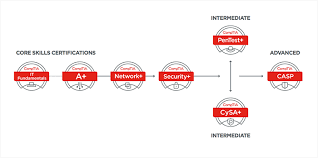
IT Fundamentals > A+ > Network+ > Security+ > CySA+ or PenTest+ > CASP
With cybercrime on the rise and vulnerabilities constantly being exposed, it is imperative that organizations take a proactive stance to protecting assets and employing skilled cybersecurity professionals. In fact, the U.S. Bureau of Labor Statistics predicts that the number of information security jobs will increase 28 percent from 2016 to 2026, making it one of the fastest-growing fields. Jobs requiring cybersecurity skills continue to grow rapidly, with more than 313,000 cybersecurity job openings, according to Cyberseek. Employers, from government to Fortune 500 companies, value CompTIA as an authority in cybersecurity certifications.
$116,323/year; Average Salary for Penetration Tester for 2021 (ZipRecruiter).
$99,815/year; Average Salary for Cybersecurity Analyst for 2021 (ZipRecruiter).
Information security jobs will increase by 28% from 2016 to 2026
There are more than 313,000 cybersecurity job openings
96% of managers use certifications as recruitment criteria.
How to Get into Cybersecurity
The CompTIA Cybersecurity Career Pathway helps IT pros achieve cybersecurity mastery, from beginning to end. The centerpiece is the CompTIA Security+ certification. It establishes the foundational knowledge required of any cybersecurity role and provides a springboard to intermediate-level cybersecurity jobs. With performance-based questions, it emphasizes the hands-on practical skills used by junior IT auditors, systems administrators, network administrators and security administrators.
After earning CompTIA Security+, cybersecurity professionals can take the next step by pursuing an intermediate skills-level cybersecurity certification, such as CompTIA Cybersecurity Analyst (CySA+) or CompTIA PenTest+.
The CompTIA Cybersecurity Analyst certification assesses the skills needed to apply behavioral analytics to networks to improve the overall state of IT security. The certification covers tools such as packet sniffers, intrusion detection systems (IDS) and security information and event management (SIEM) systems. After the seminal Target attack of 2014, the security analyst job role has gained more importance, making these skills essential for most organizations.
While CySA+ focuses on defense through incident detection and response, CompTIA PenTest+ focuses on offense through penetration testing and vulnerability assessment. It involves launching attacks on systems, discovering the vulnerabilities and managing them and is intended for cybersecurity professionals tasked with identifying, exploiting, reporting and managing vulnerabilities on a network.
As of Jan 28, 2021 the average annual salary for Penetration Tester is $116,323*.
The Average Salary for Cybersecurity Analyst for 2021 is $99,815/year (ZipRecruiter).
This career is in one of the fastest-growing job markets**.
The progression from CompTIA Security+ to CompTIA CySA+ and/or CompTIA PenTest+ is logical because Security+ assesses the knowledge, skills and abilities (KSAs) an IT professional demonstrates after two years of cybersecurity field work, and CySA+ and PenTest+ assess three to four years of cybersecurity field work.
IT pros can pursue CompTIA Advanced Security Practitioner (CASP+) to prove their mastery of cybersecurity skills required at the 5- to 10-year experience level. CASP+ is the pinnacle of cybersecurity certifications and includes performance-based questions. It is intended for those who wish to remain immersed in hands-on enterprise security, incident response and architecture, for example, as opposed to strictly managing cybersecurity policy and frameworks.
The Building Blocks of Cybersecurity
But how do you get into cybersecurity with no experience? If you have limited experience in IT and aren’t quite ready to start with CompTIA Security+, then you’ll want to start earlier on the pathway.
CompTIA A+ validates the skills employers look for in new and aspiring IT support professionals. In addition to covering today’s core technologies in operating systems, cloud, data management and more, the new CompTIA A+ Core Series covers baseline security skills at the end point device level, including malware detection and removal, privacy concerns, physical security and device hardening.
Where CompTIA A+ considers connectivity from the perspective of the user and their device, CompTIA Network+ focuses on the connections from (and between) the core systems to the endpoint devices. It validates the essential knowledge and skills needed to design, configure, manage and troubleshoot wired and wireless networks. To best support and ultimately secure the systems that exchange information on your network, you must first understand how the network functions.
CompTIA A+ and CompTIA Network+ follow a progression consistent with the KSAs an IT professional exhibits as they move from an early career technical support role with 9 to 12 months of general IT experience to one with 1 to 2 years of general IT experience, and with a significant part of that specific to network support and administration.
CompTIA Network+ is also an important and strongly recommended prerequisite to CompTIA Security+. Before you can secure a network, you must understand how it functions. In other words, you shouldn’t skip algebra to start with calculus. Otherwise, you are learning security skills and applying them to a network you don’t understand.
Talk to you next week,
Mike
Live 8-week CompTIA Security+ training for only $500!
 US and International Discount Exam Vouchers: Purchase a CompTIA voucher and save on the cost of your exams.
US and International Discount Exam Vouchers: Purchase a CompTIA voucher and save on the cost of your exams.
Interactive simulations: TotalSims for A+, Network+, and Security+, hundreds of online simulated labs. Prepare for CompTIA’s performance-based questions and learn technical concepts covered on the exams.
E-books are available: Check out our e-book titles. Available 24/7 for immediate access on the Total Seminars Training Hub
